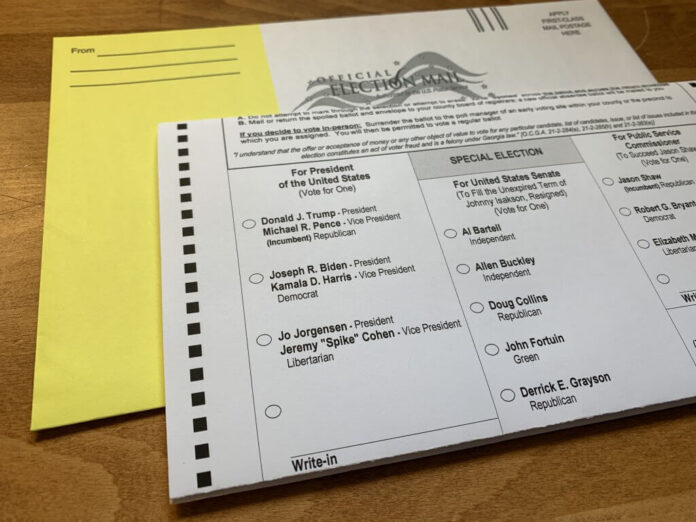
(Georgia Recorder) — The newly appointed chairman of the Georgia State Election Board cast the deciding vote on Tuesday against recommending that state legislators ban no-excuse absentee voting.
In a 3-2 vote on Tuesday, the election board struck down the recommendation to no longer allow any Georgia voters to request absentee ballots after Chairman John Fervier declined the request from a fellow board member that the General Assembly dissolve a rule passed in 2005.
Absentee ballots in Georgia have been under increased scrutiny after the State Election Board adopted emergency rules in 2020 in response to the pandemic’s public health emergency. A record number of Georgians voted by mail-in ballot in the 2020 general election cycle, highlighted by the presidential race between Republican Donald Trump and then-Democratic nominee Joe Biden and a pair of U.S. Senate contests.
Trump and many of his supporters would blame his loss in 2020 on unfounded accusations of rampant voting fraud while trying to pressure state officials in Georgia to put an end to no-excuse absentee voting.
Election Board member Janice Johnston said Tuesday that she wanted to have legislators take action because she fears that unilaterally allowing voters to fill out paper ballots outside of their polling place violates federal and state laws protecting ballot secrecy while also posing a higher risk of voter fraud.
Johnston, who was nominated to the board in 2022 by the Georgia Republican Party, referenced the high frequency of complaints and investigations into absentee errors and illegal voting brought to the board’s attention in the last couple of years. She proposed reinstating the prior law, which limited mail-in ballots to military service members, the elderly, and voters with disabilities.
Johnston said that the widespread use of absentee voting undermines confidence in elections.
“The idea of no-excuse for absentee voting seems easy and convenient, but the loss of control of the ballot, the loss of the right to vote by secret ballot, the risk of fraud, and the occurrence of subtle or outright voter intimidation is real,” she said. “Simply put, the risk outweighs the benefit.”
Fervier acknowledged the strong opinions on both sides of the issue. However, he said he believes Georgia lawmakers decided to open up the vote-by-mail process to all registered voters because it was in the public’s interest. Georgia lawmakers in 2005 adopted the no-excuse law that allowed any registered voter to request an absentee ballot without having to provide a specific reason.
Republican Gov. Brian Kemp appointed the longtime Waffle House executive to chair the board in January following the resignation of former federal court judge William Duffey Jr.
“For me, it comes down to the will of the people, and the will of the people has been voted on by the General Assembly,” Fervier said.
Georgia Democratic lawmakers and progressive voting rights organizations have opposed recent Republican-backed absentee proposals they contend unfairly add barriers for legal voters.
Republican legislators passed a sweeping overhaul of voting laws several months after the 2020 presidential election. The changes to absentee voting included eliminating signature verification by requiring voters to provide their driver’s license or other state ID numbers and limiting where and how many dropboxes local election officials can provide for people to deposit ballots.
During his tenure as a Fulton County Republican state legislator, Ed Lindsey supported the switch to no-excuse absentee voting. On Tuesday, the election board member said he opposed returning to the old rule when there wasn’t evidence supporting systemic voting fraud in 2020 or subsequent elections.
Lindsey also referenced the new election security measures approved by legislators since 2021.
The state Legislature still has the power to approve new absentee rules this year, even though the election board rejected a no-excuse ban recommendation. The legislative session is scheduled to end on March 29.
Georgia’s 2024 election cycle begins with the presidential primary on March 12, leading up to the Nov. 5 general election, which is expected to be headlined by a rematch between Trump and Biden.
“We should not only a few months before the election…bring confusion and start to limit the ability of people in our state to vote, particularly people who oftentimes find it most difficult to stand in line because of certain life situations,” Lindsey said.
Rick Jeffries, a newly appointed board member and former GOP state representative, backed Johnston’s proposal Tuesday. Democratic board member Sara Tindall Ghazal voted against the measure.







